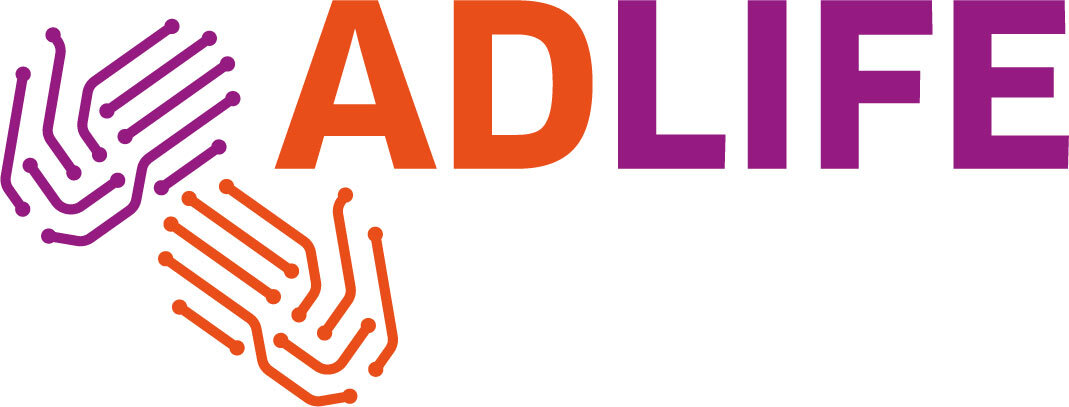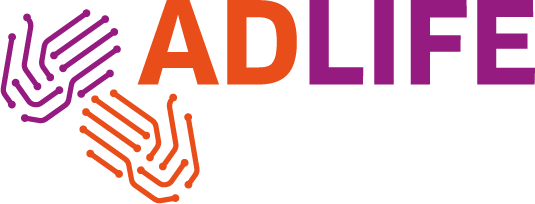
ADLIFE Newsletter
Issue 6 | December 2021
Welcome back to ADLIFE's newsletter! As we fast approach the end of 2021, here's a summary of what we've been up to...
Highlights from ADLIFE
We held our ADLIFE consortium plenary meeting on 16th and 17th November. We are all now well used to this virtual meeting environment and we used the meeting productively to update progress across all the workpackages and discuss essential aspects of the pilot trial conduct.
We look forward to better days when travel is permitted, and we can share the culture of our Partners rather than simply share our screens.
As the project continues we will provide updates about our exciting development activities, so look out for more information about how ADLIFE is progressing in future issues of our Newsletter.
Where we’ve (virtually) been…
Since our last newsletter we have participated in and hosted at events and conferences across Europe - virtually that is!
Digifest 2021
Digifest is Scotland’s annual Digital Health and Care Event hosted by the Scottish Government’s Digital Health and Care Directorate. During November and December Digifest presented a virtual programme, reflecting a range of topics showcasing digitally enabled solutions within the context of citizens, services, home, and environment.
ADLIFE-SCIROCCO Webinar - How important is digital maturity when implementing integrated healthcare systems?
On 9th December, ADLIFE jointly participated in a Webinar with SCIROCCO Exchange to discuss the concept of digital maturity in relation to evaluating readiness and capacity for the adoption of integrated digital care solutions. To access a recording of the webinar, Click here then select 'Satellite Sessions' and scroll down to the ADLIFE webinar and click 'watch on demand'.
Digifest Resource Event
ADLIFE was also promoted within the Digifest Resource Event, with the ADLIFE YouTube video and short news item discussing The Digital Health and Care Policy Agenda in Scotland included in this online space. Click here to access the ADLIFE information in the Resource Event.
VIII International Congress for Digital Health
In September, Aratz Setién of NTT Data presented ‘ADLIFE: a REAL case of Federated Learning’ in the ‘International Experiences of Value Based Digital Health’ session of the VIII International Congress for Digital Health in Donostia/San Sebastian. During this presentation, Aratz explained the ADLIFE project, focusing on the Clinical Decision Support Services (CDSS) and giving details about the federated learning process and the architecture.
Click here for more information about the congress.
And here’s what we have coming up in 2022…
The 22nd International Conference on Integrated Care is due to take place in Odeon in Odense in Denmark between 23-25 May 2022. Denmark is amongst the international frontrunners when it comes to integrated healthcare services, for example it has shown remarkable progress in Danish cancer survival rates through clinical pathways that connect hospitals, clinics, GPs and patients. The conference will operate as a hybrid event, while people will be able to be physically present, those who do not wish to travel can join and present at the conference via video link and present their paper digitally.
ADLIFE have submitted 3 abstracts to the conference covering topics including: an overview of the ADLIFE health data system integration architecture; shared decision making in ADLIFE and the ADLIFE health outcome framework.
Click here to access the conference website.
New website
Our current website has been a bit quiet of late. That’s because we have been hard at work behind the scenes re-designing our website layout and structure. We look forward to sharing our new look with you early in 2022!
Click here to access our current website.
Meet the ADLIFE Team
Because the restrictions imposed by the global pandemic prevent us meeting up in person, it's important that we find different ways to help us get to know each other better. In this Newsletter we meet Gabriela Maxwell, the Principal Investigator at the pilot site in NHS Lanarkshire. Gabriela shares her background and her thoughts about the ADLIFE project with us.
Gabriela Maxwell, the ADLIFE Principal Investigator for NHS Lanarkshire is a Nurse Consultant in Primary Care. Her background is in Primary Care Advanced Nursing Practice (Urgent In and Out of hours care) and in Secondary Care Front Door Services and Critical Care.
Gabriela’s current role involves advising in relation to Nursing in Primary & Community Care services across NHS Lanarkshire and supporting the implementation of the Primary Care Improvement plan. She works closely with team members to provide strategic vision for the development, improvement and delivery of service within NHS Lanarkshire and the Health and Social Care Partnership and further afield, as appropriate. She collaborates on projects related to the development and delivery of specialist educational programmes to meet the needs of nurses and other relevant stakeholders and is involved in various aspects of research. In her clinical practice Gabriela demonstrates expert practice and knowledge in relation to Primary and Community Care.
Gabriela explains ‘I am the ADLIFE Principal Investigator for NHS Lanarkshire and, even though it is a huge learning curve, it is a privilege to represent NHS Lanarkshire and be part of this unique opportunity. I got involved in the project because research and development is an important part of my role. I hope the main benefit ADLIFE will be in empowering patients to manage their condition effectively as well as improving communications between primary and secondary care services to create a more seamless journey for the patient. I think patients will engage well with the project and I hope carers find it helpful. It would also be good if ADLIFE could be used to give patients and carers the opportunity to engage with each other more than they do now and could encourage more peer group support and reduce feelings of social isolation. I am conscious that for health care professionals and patients engaging with the project it might be challenging to put their energy into something that will potentially be used for just the duration of the trial and they might worry about ‘what happens after it’s gone’. But even if this is the case, ADLIFE will contribute to telehealth developments within the wider health service and help to broaden the spectrum of expertise in digital health initiatives for its most appropriate use in the future.












